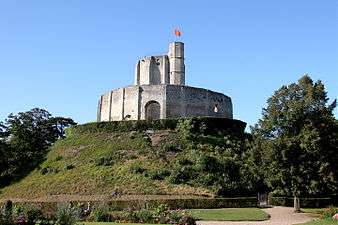Gisors
| Gisors | ||
|---|---|---|
|
City as seen from the castle terrasse | ||
| ||
 Gisors | ||
|
Location within Normandy region  Gisors | ||
| Coordinates: 49°16′52″N 1°46′38″E / 49.2811°N 1.7772°ECoordinates: 49°16′52″N 1°46′38″E / 49.2811°N 1.7772°E | ||
| Country | France | |
| Region | Normandy | |
| Department | Eure | |
| Arrondissement | Les Andelys | |
| Canton | Gisors | |
| Intercommunality | Gisors-Epte-Lévrière | |
| Government | ||
| • Mayor (2008–2014) | Marcel Larmanou | |
| Area1 | 16.67 km2 (6.44 sq mi) | |
| Population (2008)2 | 11,681 | |
| • Density | 700/km2 (1,800/sq mi) | |
| Time zone | CET (UTC+1) | |
| • Summer (DST) | CEST (UTC+2) | |
| INSEE/Postal code | 27284 / 27140 | |
| Elevation |
47–142 m (154–466 ft) (avg. 74 m or 243 ft) | |
|
1 French Land Register data, which excludes lakes, ponds, glaciers > 1 km² (0.386 sq mi or 247 acres) and river estuaries. 2 Population without double counting: residents of multiple communes (e.g., students and military personnel) only counted once. | ||
Gisors is a commune of Normandy, France. It is located 62.9 km (39.1 mi) northwest from the centre of Paris.
Gisors, together with the neighbouring communes of Trie-Château and Trie-la-Ville, form an urban area of 12,669 inhabitants (1999 census). This urban area is a satellite town of Paris.
Geography
Gisors is located in the Vexin normand region of Normandy at the confluence of the Epte, Troesne and Réveillon rivers .
Population
| Historical population | ||
|---|---|---|
| Year | Pop. | ±% |
| 1793 | 3,021 | — |
| 1800 | 3,650 | +20.8% |
| 1806 | 3,277 | −10.2% |
| 1821 | 3,339 | +1.9% |
| 1831 | 3,533 | +5.8% |
| 1836 | 3,364 | −4.8% |
| 1841 | 3,624 | +7.7% |
| 1846 | 3,616 | −0.2% |
| 1851 | 3,653 | +1.0% |
| 1856 | 3,694 | +1.1% |
| 1861 | 3,654 | −1.1% |
| 1866 | 3,573 | −2.2% |
| 1872 | 3,834 | +7.3% |
| 1876 | 4,047 | +5.6% |
| 1881 | 4,362 | +7.8% |
| 1886 | 4,359 | −0.1% |
| 1891 | 4,462 | +2.4% |
| 1896 | 4,681 | +4.9% |
| 1901 | 4,861 | +3.8% |
| 1906 | 4,888 | +0.6% |
| 1911 | 5,508 | +12.7% |
| 1921 | 5,494 | −0.3% |
| 1926 | 5,564 | +1.3% |
| 1931 | 5,868 | +5.5% |
| 1936 | 5,867 | −0.0% |
| 1946 | 5,078 | −13.4% |
| 1954 | 5,670 | +11.7% |
| 1962 | 6,398 | +12.8% |
| 1968 | 7,329 | +14.6% |
| 1975 | 8,069 | +10.1% |
| 1982 | 8,732 | +8.2% |
| 1990 | 9,481 | +8.6% |
| 1999 | 10,884 | +14.8% |
| 2008 | 11,681 | +7.3% |
Transport
The Gisors-Embranchement station is the terminus of a Transilien suburban rail service from the Paris Saint-Lazare station.
Sights
- Château de Gisors, built in the 11th century.
- The Saint-Gervais-Saint-Protais parish church is an outstanding monument fusing Gothic and Renaissance architecture.
- A field near Gisors was the site of the cutting of the elm.[1][2][3]
 Motte and Castle
Motte and Castle- Castle of Gisors
 The so-called Grosse Tour ("Big Tower") of the St-Gervais-St-Protais church was built between 1542 and 1590.
The so-called Grosse Tour ("Big Tower") of the St-Gervais-St-Protais church was built between 1542 and 1590.
See also
References
- ↑ Bradford Smith, The Foundations of the West - Course Material, Chapter 8 The Age of the Crusades - The Rise of France under Philip Augustus and of St. Louis Oglethorpe University, Summer 2000.
- ↑ Nicholas Vincent, "William Marshal, King Henry II and the Honour of Chateauroux", in: Archives: The Journal of the British Record Association vol. 25, no. 102 (2000).
- ↑ A Thirteenth-Century Minstrel's Chronicle, a translation by Robert Levine of the Récits d'un ménestrel de Reims, a thirteenth-century historical fiction, Mellen Press, Lewiston, 1990.
External links
| Wikimedia Commons has media related to Gisors. |
- Official site
- Gazetteer Entry
 "Gisors". Encyclopædia Britannica (11th ed.). 1911.
"Gisors". Encyclopædia Britannica (11th ed.). 1911.
This article is issued from Wikipedia - version of the 11/9/2016. The text is available under the Creative Commons Attribution/Share Alike but additional terms may apply for the media files.

.svg.png)